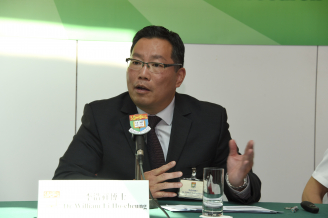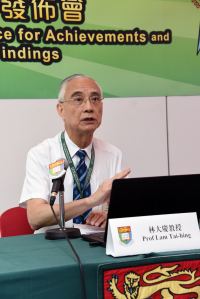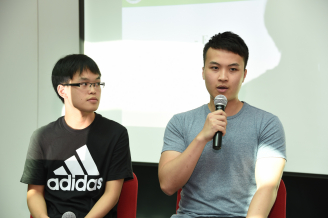Media
HKU Youth Quitline Smoking Cessation Hotline
Helps Youths Quit Smoking, Reduce Risk Behaviours and
Promote Physical and Psychological Health
31 May 2018

(From the middle left) Professor Chia-Chin Lin, Head, School of Nursing, Li Ka Shing Faculty of Medicine, HKU; Professor Lam Tai-hing, Sir Robert Kotewall Professor in Public Health and Chair Professor of Community Medicine, School of Public Health, Li Ka Shing Faculty of Medicine, HKU; Dr William Li Ho-cheung, Project Director of the “Youth Quitline” and Associate Professor of School of Nursing, Li Ka Shing Faculty of Medicine, HKU; Ms Vienna Lai, Executive Director of Hong Kong Council on Smoking and Health; others are Peer Smoking Cessation participants.
Since its establishment in 2005, the “Youth Quitline”, operated by the Smoking Cessation Research Team of the School of Nursing, The University of Hong Kong (HKU), has continuously helped participants quit smoking. Phase four of the hotline service (December 1, 2016 - March 31, 2018) helped over one-fifth of the participants who have joined the service for 6 months to quit smoking. The quit rate is about 3% higher than that of the previous phase. In addition, the “Youth Quitline” has helped participants reduce risk behaviours and promote physical and psychological health.
“Youth Quitline” and its effectiveness
The smoking cessation hotline “Youth Quitline”, established in 2005, is the first youth-oriented (aged 25 or below) smoking cessation hotline in Hong Kong. “Youth Quitline” has been funded by the Tobacco Control Office under the Department of Health since October 2011 and it has been awarded the funding for the fourth time in 2016-18.
Since its establishment in 2005 till March 31, 2018, “Youth Quitline” has answered 11,175 telephone enquiries and provided smoking cessation counselling for 2,265 youth smokers. In phase four of the service, the Quitline has helped 23.1% of participants who have joined the service for 6 months to quit smoking. The quit rate is 2.9% higher than that of the previous phase. Among those who have not yet quitted, 26% has reduced their cigarette consumption at least by half.
“Youth Quitline” approach and profile of youth smokers in the smoking cessation programme
During phase four of the hotline service (December 1, 2016 - March 31, 2018), a total of 281 participants joined the programme, of which 160 of them have joined the service for 6 months. Among the 160 participants, the male: female ratio was around 84%:16%, and the mean age was 19.4 years. Over 40% of the participants were full-time students who also worked as part-time employees. Participants consumed 9.5 cigarettes per day on average and over 65% had mild nicotine dependence.
“Youth Quitline” finds that 40% of the 160 participants who have joined for 6 months in phase four of the service reported to have levels of depressive symptoms at baseline higher than the normal range, 55% had drinking habit and over 35% did not have any exercise habit at baseline.
To prevent relapse and enhance the effectiveness in quitting smoking, “Youth Quitline” helps participants through telephone counselling services, which not only focus on their smoking status and encourage them to quit smoking, but also assist participants to establish a healthy lifestyle, educate them about the coping skills for managing emotions and to avoid engaging in any risk behaviours. Among those who reported to have levels of depressive symptoms at baseline higher than the normal range, drinking habit, or did not have any exercise habit at baseline, positive results proved that after telephone counselling, for nearly 60% of them, depressive symptoms were reduced; over 30% quitted drinking habit; and 20% participated in regular exercise.
Participants’ attitude towards tobacco control policies
According to the World Health Organization, raising tobacco tax is an effective tobacco control measure in encouraging smokers to quit smoking and preventing youths from starting smoking in many countries and regions including Hong Kong. From phase three to phase four (June 1, 2015 - March 31, 2018), over 45% of the participants supported raising tobacco tax by 100% (to HK$100 per packet), nearly 60% agreed raising the tobacco sales age to 21 and over 35% supported the implementation of plain packaging.
The way forward
Dr William Li Ho-cheung, Associate Professor of School of Nursing, Li Ka Shing Faculty of Medicine, HKU, and Director of the “Youth Quitline” Programme, hopes to further strengthen the training on the areas of coping skills for managing emotions and healthy lifestyle in the counsellor training programme, and the use of information and communication technologies in the Quitline service. By enhancing public awareness, strengthening the connection with schools and organisations, and exploring more outreach opportunities in the coming year, Dr Li believes that “Youth Quitline” can reach and help more youth smokers quit smoking and deliver smoke-free messages to the wider community.
Professor Lam Tai-hing, Sir Robert Kotewall Professor in Public Health and Chair Professor of Community Medicine, School of Public Health, Li Ka Shing Faculty of Medicine, HKU advocates raising tobacco tax by 100%, and adopting long-term and comprehensive tobacco control policies including the implementation of plain packaging, raising the tobacco sales age to 21, allocating more resources for smoking cessation services and education to further reduce the smoking prevalence.
About “Youth Quitline” 5111 4333
The Smoking Cessation Research Team of the School of Nursing, in collaboration with the School of Public Health of the Li Ka Shing Faculty of Medicine, the Department of Social Work and Social Administration of HKU and the Hong Kong Council on Smoking and Health, established the first youth-oriented smoking cessation hotline “Youth Quitline” in 2005. “Youth Quitline” aims to raise the awareness of smoking cessation service among young people in Hong Kong and to provide free-of-charge smoking cessation service to youth smokers. It also aims to provide training to young people as peer smoking cessation counsellors. All this is always done together with vigorous research and evaluation to improve the Quitline service and generate new knowledge and evidence to support tobacco control. “Youth Quitline” also proactively helps schools and other organisations to promote smoking cessation through outreach programmes. “Youth Quitline” targets youth smokers aged 25 or below. Service hours are Monday to Friday, from 5pm to 9pm; Saturday and Sunday from 2pm to 8pm. Voicemail is available during public holidays. All young people are welcome to contact “Youth Quitline” through telephone, social media (WhatsApp, Facebook) or website (www.hku.hk/yquit) to join the smoking cessation programme.
Media enquiries, please contact:
Please contact Li Ka Shing Faculty of Medicine of The University of Hong Kong by email (medkefa@hku.hk).
Please visit the website at http://www.med.hku.hk/news/ for press photo.
Dr William Li Ho-cheung, Associate Professor of School of Nursing, Li Ka Shing Faculty of Medicine, HKU, and Director of the “Youth Quitline” Programme, hopes to further strengthen the training on the areas of coping skills for managing emotions and healthy lifestyle in the counsellor training programme.



